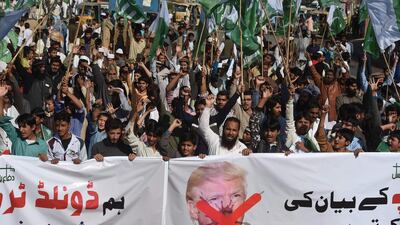Pakistan summoned the US ambassador in a rare public rebuke after Donald Trump lashed out at Islamabad with threats to cut aid over alleged lies about militancy.
In the latest spat to rock the shaky alliance between the two countries, ambassador David Hale was asked to go to the foreign ministry in the Pakistani capital on Monday night, after Islamabad responded when the US president accused Pakistan of providing safe havens for militants.
A US embassy spokesman on Tuesday confirmed that Mr Hale had met officials, but would not comment on what happened in the meeting. The Pakistani foreign ministry has also not commented.
Mr Trump used his first tweet of 2018 to criticise Islamabad. In the early morning of New Year's Day he said: "The United States has foolishly given Pakistan more than $33 billion in aid over the last 15 years, and they have given us nothing but lies and deceit, thinking of our leaders as fools. They give safe haven to the terrorists we hunt in Afghanistan, with little help. No more!"
Pakistan hit back swiftly, with responses from its foreign and defence ministers, saying the country had done much for the United States, helping it to decimate Al Qaeda but getting only "invective and mistrust" in return. Foreign minister Khawaja Muhammad Asif said Pakistan was doing all it could to combat terrorism within its borders.
"We have already told the US we will not do more, so Trump's 'no more' does not hold any importance," Mr Asif said.
The Pakistani government scrambled to arrange a cabinet meeting on Tuesday to adopt a response to Mr Trump's Twitter attack, while foreign minister Khawaja Muhammad Asif said his country was ready to provide publicly an account of "every detail" of US aid it had received.
Mr Trump first hinted at cutting aid to Pakistan in August, in a speech outlining his policy on Afghanistan. In recent months, other administration officials including vice president Mike Pence have also intimated there would be cuts.
Observers pointed out that without more information, Mr Trump tweet could just be more hot air between the uneasy allies, whose often fractious relationship has taken a nosedive under his leadership.
"Trump is in the habit of issuing hardline statements which only spoil the atmosphere and violate diplomatic niceties," security and diplomatic analyst Hasan Askari said, advising Pakistan to seek clarification.
Political analyst Imtiaz Gul said: "It will only add to the acrimony that has crept into the relationship after Trump's arrival in the White House."
After the September 11, 2001 attacks on the United States, Washington forged a strategic alliance with Islamabad to help in its fight against militancy. But Washington and Kabul have long accused Islamabad of supporting militant groups, including the Taliban, which is believed to have links to Pakistan's shadowy military establishment that aims to use them as a regional bulwark against arch-nemesis India.
Islamabad has repeatedly denied the accusations, lambasting the US for ignoring the thousands who have been killed on its soil and the billions spent fighting extremists.
- 'Harsh' response -
Mr Trump's August speech accused Islamabad of harbouring "agents of chaos" and triggered a series of high-level diplomatic meetings in the US and Pakistan.
The Trump administration also told congress in August it was weighing up whether to withhold $255 million (Dh936.5m) in earmarked aid to Islamabad over its failure to crack down more effectively on terrorist groups in Pakistan. But Islamabad has given few signs of concessions.
Of foremost concern to the US is Islamabad's attitude towards the powerful Haqqani network, whose leader, Sirajuddin Haqqani, is the deputy leader of the Afghan Taliban. The group is accused of some of the most lethal attacks on US forces in Afghanistan. America's former top military officer Mike Mullen dubbed it a "veritable arm" of Pakistani intelligence.
For many years the network found safe haven in Pakistan's semi-autonomous north-west tribal areas. But the Pakistani military launched an operation there in 2014, and now insists it has eradicated all safe havens in the country.
For Pakistan, analyst Mr Gul noted, the assumption is that arch-rival and fellow nuclear power India is fuelling Mr Trump's hostility towards Islamabad. India, which Pakistan views as an existential threat, has long competed with Islamabad for influence in Afghanistan, building dams, roads and a new parliament in the troubled country, offering millions in aid and training security forces. Mr Trump and other officials in his administration have urged India to become more involved in Afghanistan, an idea that is anathema to Islamabad, which fears becoming encircled by India or Indian spheres of influence.
"Now Pakistan's first attempt will be to neutralise India's narrative of Pakistan," Mr Gul said.
_______________________
Read more:
Trump's first tweet of 2018 threatens to cut aid to Pakistan
Why Pakistan's ex-army chief is the man to lead the terror alliance
Nine killed in Pakistan Taliban attack on college in Peshawar
_______________________

